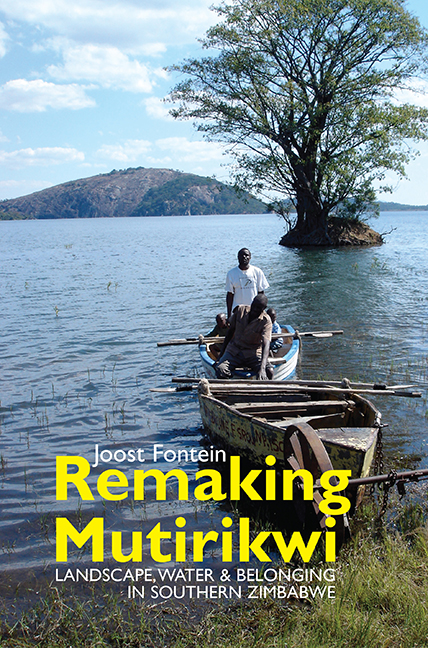Book contents
- Frontmatter
- Dedication
- Contents
- Illustrations
- Acknowledgements
- Note on Fieldwork, Notes & Sources
- Glossary
- Acronyms & Abbreviations
- Chronology
- Remaking Mutirikwi: An Introduction
- Part One Remaking Mutirikwi in the 2000s
- Part Two Damming Mutirikwi 1940s–1990s
- Epilogue: Remaking Mutirikwi in the late 2000s & early 2010s
- Bibliography
- Index
- Eastern African Studies
8 - War and Danger in the Wake of the Dam, 1970s
Published online by Cambridge University Press: 11 June 2021
- Frontmatter
- Dedication
- Contents
- Illustrations
- Acknowledgements
- Note on Fieldwork, Notes & Sources
- Glossary
- Acronyms & Abbreviations
- Chronology
- Remaking Mutirikwi: An Introduction
- Part One Remaking Mutirikwi in the 2000s
- Part Two Damming Mutirikwi 1940s–1990s
- Epilogue: Remaking Mutirikwi in the late 2000s & early 2010s
- Bibliography
- Index
- Eastern African Studies
Summary
AFTER THE DAM
This chapter and the next are about what happened after the dam and after the war that followed, taking us back to the remaking of Mutirikwi's landscapes in the 2000s with which the book began. It is a story about the re-assertion of African pasts and presence that the dam and everything that came with it failed to obliterate. It is also about African futures frustrated in the wake of war, in which the perceived ruptures of history – the dam, war, independence, eviction and return – diminish in context of material and imaginative endurances, co-existences and proximities. Both the optimism and insecurities of the 1970s, and the euphoria and frustrations of the 1980s, tell of the accumulative, openended becoming of landscape, of the enduring political materialities of land and water, and the proximity and co-existence of different regimes of rule, meaning and practice entangled with it.
In some respects Kyle dam was obsolete almost as soon as it was built. It did provide water for the expanding lowveld industries, Masvingo town, and the various recreational developments around it. Some of its imagined futures did endure, and its consequential presence in Mutirikwi's landscapes continued to affect land occupations in the 2000s. Yet the optimistic ‘axiom of the age’, in which heroic dam building promised industrial expansion, food security and new white settler futures, did not fare so well. Traces of this ethic still resound, particularly in the lowveld. In 2006 Ray Sparrow told me, as we watched hippos in a dam below his Chiredzi home, that ‘by far the best thing I ever did was bring water to lowveld’. Yet such nostalgic reminiscences reflect, like late Rhodesia's burst of self-commemoration, how the inflated, imagined European futures animating water planning between the 1940s and 60s, proved much more fragile than the dams themselves did.
Shortly after Kyle was completed the Federation dissolved. It had been the nexus of many of these water-inflected European futures (cf. Tischler 2013). With this demise its limited liberalising influences waned. White Rhodesia swung to the parochial right with Garfield Todd's removal by his own cabinet, the Rhodesian Front's election and the Unilateral Declaration of Independence (UDI) in 1965. Accompanying this changing political mood, the Native Land Husbandry Act (NLHA)'s unpopular, modernising impulses were inverted little more than a decade after being introduced.
- Type
- Chapter
- Information
- Remaking MutirikwiLandscape, Water & Belonging in Southern Zimbabwe, pp. 230 - 255Publisher: Boydell & BrewerPrint publication year: 2015

